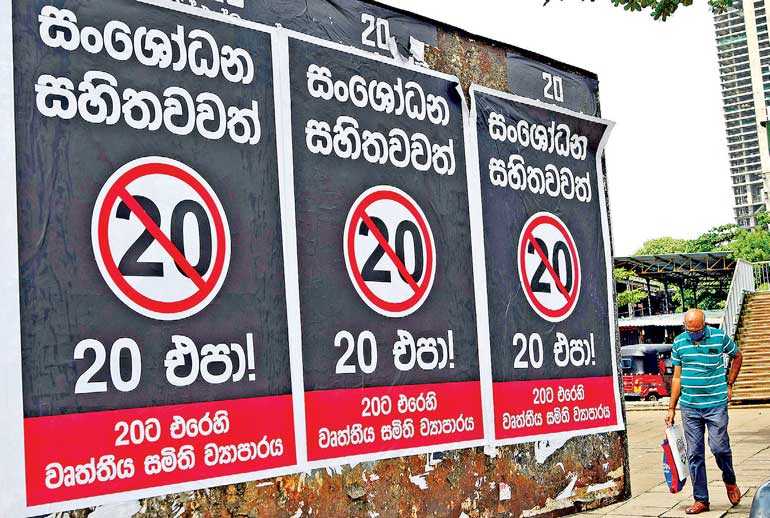Wednesday Feb 18, 2026
Wednesday Feb 18, 2026
Tuesday, 20 October 2020 00:29 - - {{hitsCtrl.values.hits}}

Several issues spring to mind while attempting to make sense of two documents now in the public domain: The draft 20A and the leaked Supreme Court’s determination – Pic by Shehan Gunasekara
Even with COVID-19 spreading in unexpected ways and in too many places, it wasn’t enough to overwhelm the curiosity, anxiety and interest in the President’s draft of the 20th Amendment to the Constitution, as the country awaits with interest a new Constitution which a Minister promised would be presented in six months.
With numerous petitions, discussions, webinars, and the Supreme Court determination, the curiosity of an ordinary citizen has turned into confusion. But these are matters for lawyers who know these things. And for parliamentarians who are entrusted with protecting the people’s sovereignty in evaluating such amendments.
So here are some issues that sprang to mind for consideration by those who are tasked with voting for draft amendments, while attempting to make sense of two documents now in the public domain: The draft 20A and the leaked Supreme Court’s determination.

1. The Supreme Court determined that Clause 3 of 20A (Duties and Functions of the President) as it is, needs a Referendum because it removes:
33 (d) “It shall be the duty of the President, on the advice of the Election Commission, to ensure the creation of proper conditions for the conduct of free and fair elections and referenda.”
However the Supreme Court determined that if it is amended as per the Attorney General’s submissions, to
“(c) ensure the creation of proper conditions for the conduct of free and fair elections at the request of Election Commission”, then the inconsistency would cease and therefore wouldn’t need a referendum.
Does the inconsistency still remains ceased despite the following?
a. Where is the reference to referenda which was in Article 33 (d) of the Constitution which is sought to be repealed?
Isn’t this significant especially when Clause 16 of draft 20A seeks to have defeated bills put to a vote at a referendum?
The new Constitution which is planned will also need a referendum.
Aren’t referenda covered anymore after the 20th Amendment?
b. The duty of the President, “on the advice of” the Election Commission to conduct free and fair elections means the responsibility still lies with the President for free and fair elections. However, the substitution of that sentence with “ensuring” the conduct of free and fair elections “at the request” of the EC passes the responsibility to the EC, or so it seems.
What if the Election Commission fails to “request” such a thing? Does the Election Commission have a duty to request the President to conduct free and fair elections? This doesn’t seem to be in the Constitution.
Does the Election Commission have a constitutional duty to ensure free and fair elections?
By seeking to remove Article 104GG (Compliance with the Election Commission’s requests) doesn’t draft 20A also reduce the authority of the Election Commission to ensure free and fair elections anyway?
c. Removing “duty” to ensure free and fair elections, together with the removal of immunity from suit (even with the promised amendment), still leaves the citizen deprived of the guarantee afforded them by the Constitution in allocating that duty to the President who is constitutionally accountable to the people.
d. This is especially significant when Article 22 of 20A seeks to repeal Article 104GG which ensures compliance with the Election Commission by Public Officers, employees of Corporations and Business with 50% of shares held by the Government and makes non-compliance an offence that could lead to imprisonment in addition to a fine. (The Supreme Court has however determined that Article22 needs a referendum)
2. The Supreme Court determined that Clause 5 (Immunity from suit) needs a Referendum.
The Attorney General argued that this only takes it back to the 1978 Constitution.
The Supreme Court has pointed out that any enhancement of sovereignty cannot be reduced without a referendum.
However, the Supreme Court determination states that if Clause 5 is “suitably amended” to “make provision for the People to invoke jurisdiction of the Supreme Court under Article 126, in the instances where there is a violation or an alleged imminent violation of a Fundamental Right due to an act of the President, the inconsistency would cease.[Article 17 : “Every person shall be entitled to apply to the Supreme Court, as provided by Article 126, in respect of the infringement or imminent infringement, by executive or administrative action, of a fundamental right to which such person is entitled under the provisions of this Chapter”]
a. Isn’t the omission of Referenda from the Constitution an infringement which impinges on the franchise and therefore on the sovereignty of the people?
b. Also, isn’t passing responsibility for conduct of free and fair elections to an official appointed by the President, also a reduction of sovereignty and therefore a violation of a fundamental right?
In the context of the additional powers granted to the President to dissolve parliament, remove the PM, make all important appointments including Ministers, AG, EC, etc. doesn’t the intent to remove immunity indicate a wish to acquire rights but not responsibility, power but not accountability?
3. If a new Constitution is due in six months, why seek power now, to
What good will it do, to do all these things before the next Constitution is approved by the people and the Parliament in six months?
The only thing that jumps out to a non-legal mind is that the President may be perceived to have the power to ensure that PM, Cabinet, some parliamentarians and other relevant appointed officials will go along with the provisions in a new Constitution since he will have the right to remove any of those people at will, and the Elections Commission will have reduced powers at the time of the referendum (repeal of Article 104GG by Clause 22) but enhanced responsibility for the conduct of it.
Fortunately the Supreme Court has ruled that Clause 22 needs a referendum, therefore the Election Commission’s existing powers will hopefully remain.
However it appears that the draft 20A, sought to ensure a clear path to the passage of a new Constitution, minimising possible opposition to it, and taking away the people’s right to the constitutional guarantee of a free and fair referendum.